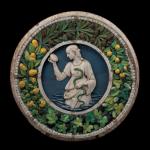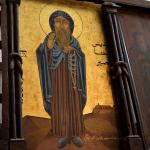
St. Antony the Great, though remembered in history as one of the great early monastic leaders, and possibly one of the greatest monks to have ever lived, still was a human being who had to learn how to live out his life the way God intended it to be lived. He made mistakes. He sometimes did things wrong. He sometimes had to change his ways, either because he misunderstood what he should be doing, or else, because he had gained all he could from the spiritual practice he had been engaging and it was time to move on to something new. One thing he had to constantly embrace all his life, and so had to be constantly reminded how important it was for his own spiritual health, was humility. Each time he found himself growing spiritually, he had to make sure he did not lose his humility, for if he did, then not only would that growth stop, he could find himself regressing, as pride would take over and distort his spiritual practice.
Many of the stories we have of St. Antony, especially those written down by St. Athanasius, serve to show what his monastic discipline made of him, that is, to show how great he became so that his life could serve as an example to others of what is possible for them to achieve. It is easy to read such stories and come to conclude his way was the only way to true spiritual greatness. This is, in part, because of how they were written, for they worked, in part, to recruit more people to the monastic way of life. And so, by reading about him, we can end up developing an incorrect, indeed, a romantic view of monasticism, seeing its grandeur without understanding its hardships or why it is way of life not meant for all. Or, sadly, it is possible to read such narratives as proof that the monastic vocation is the greatest vocation of all, but this is something that good monastic leaders denied, as they understood such a view would lead to undue pride and ignore the glory which could be had by those who were married or otherwise living a non-ascetic form of life. This is why many elders countered such an idealization of monasticism with stories which presented various monastic saints like Antony who learned that there were those in the world who were either his spiritual equal or superior.
Grace is what makes us great, and grace is available to people in all walks of life. Everyone will have their own way to engage it, their own way to grow in grace and sanctification. A person living in the world can become, through grace, just as great as someone who followed after Antony into the desert to confront and fight against their own internal demons. When a monastic elder pointed this out, they did so to make sure that monks would not unjustly judge, or condemn, those who had been given a different vocation. Thus, not only is there is story in the Alphabetical Collection of the Sayings of the Desert Fathers which talks about a doctor being Antony’s equal, in the Anonymous Saying Collection, we learn of a shoemaker in Alexandria who was, at least at that point in time in which the story took place, Antony’s superior:
They used to say of the holy Antony that he too was once praying in his cell when there came a voice to him saying: “Antony, you have not yet attained the stature of a certain shoemaker in Alexandria.” He rose early, took his palm-wood staff and set out to see him. When he came to the place he went in to him; the man was troubled at the sight of him. The elder said to him: “Tell me what you do.” “I am not aware that I have done anything worthwhile,” he said, “unless it is that, in the morning when I get up or sit down to my work, I say that this entire city, from the least to the great ones, will enter the kingdom by virtue of their righteous deeds, while I alone will inherit punishment because of my sins. I say the same thing again in the evening before I sleep.” On hearing this Abba Antony said: “Truly, you have inherited the kingdom like a fine goldsmith sitting restfully in his house while I, failing in perception, have lived the whole of my time in the desert without catching you up.” [1]
It is easy to see the shoemaker’s greatness was the result of his humility. It is important to note what that humility represented. It was not just that the shoemaker looked at others as his betters, nor that he considered himself the first among sinners, but rather, it was because his humility also led him to hope that everyone other than himself would likely be saved. The two factors together made him realizing he should not be judging or condemning anyone. He saw that his main concern should be with himself, understanding that his own imperfections could, if continued and embraced for eternity, lead him away from grace and the glory which it brings. There is, implicit in this story, the same teaching which would later be given by Hans Urs von Balthasar, that is, we should look to our own spiritual condition and make sure we do not lose sight of grace by denying grace to others, by denying the possibility that all might be saved. Saying that some, or many, will be damned is exactly the kind of judgment call we cannot make. We can and should see the good people do, even sinners, and see that in and through that good, there is a reason for us to hope that God will work with them, bring them grace, and thus, bring them to salvation. We do not know if it is the case, but if we are humble, we certainly will be more concerned about our own failure, our own ill-will, and the potential it has to divert us from our own salvation than that of others, whose internal spiritual life we cannot discern.
There certainly was a pedagogical point to the story, one which was aimed at the monastic audience who was expected to read the saying and discern what it meant for them. It is clear that the point was to encourage their humility, to remind that that they should not assume their own way of life made them better than others. Monasticism is one way, a very good way, to engage grace and to become great through such grace. Judging others based upon whether or not they meet monastic expectations, therefore, is in error; for others, living in the world, will have different expectations placed upon them, and so they will act differently to fit their own expectations. Humility will make sure a monk remembers this, understanding that their concern should always be in relation to their own personal faults, to make sure they struggle against them all their life, never assuming greatness for whichever faults they overcome. Certainly, they way this was done was rather harsh, and might lead someone to the point of despair, thinking no matter what they do, they are not getting better and so they might as well give up hoping for their own salvation, that is far from what is intended by this story. Rather, just as the shoemaker understood others could and would find salvation, despite what they have done, then it also points out how grace, more than what we do, is the source and foundation of our salvation, and so we can be saved by it just like others, some who we might want to judge, can and will be saved by it as well. It is quite telling, it is this humility, this humility which led the shoemaker to view others as on the path to salvation and would be saved, was also what was disclosed as making him great, holding a greatness which rivaled Antony’s. This confirms that such a hope itself is not to be rejected. Indeed, it should be seen as an important spiritual tool that can help many become holy, just as Antony and the shoemaker were holy. Such a view reinforces humility, the humility which is often lost by those who look to the world to judge and condemn all those in it. This is exactly what we see it did for Antony, and so it can and should do so for us. For if we would deny such hope, in actuality, that means we are trying to manipulate and control grace, believing there are some people who can be closed off from it, and not just any people, but those who we specifically judge and condemn. The reality is that our judgment will not do so to others, but can and will do so for us, for the judgment which we make will come back upon us, and if we deny others the possibility of grace, so long as we do so, we risk denying ourselves that same grace. But once we stop ourselves from making such a judgment, and leave it all in the hands of God, then we find, accepting others can and will receive that grace frees us to receive it as well, and so the more we hope that all others can be saved, the more we have hope that we can and will be saved as well
[1] John Wortley, trans., The Anonymous Sayings Of The Desert Fathers: A Select Edition And Complete English Translation (Cambridge: Cambridge University Press, 2013), 327-9 [N 490].
Stay in touch! Like A Little Bit of Nothing on Facebook.
If you liked what you read, please consider sharing it with your friends and family!
N.B.: While I read comments to moderate them, I rarely respond to them. If I don’t respond to your comment directly, don’t assume I am unthankful for it. I appreciate it. But I want readers to feel free to ask questions, and hopefully, dialogue with each other. I have shared what I wanted to say, though some responses will get a brief reply by me, or, if I find it interesting and something I can engage fully, as the foundation for another post. I have had many posts inspired or improved upon thanks to my readers.













